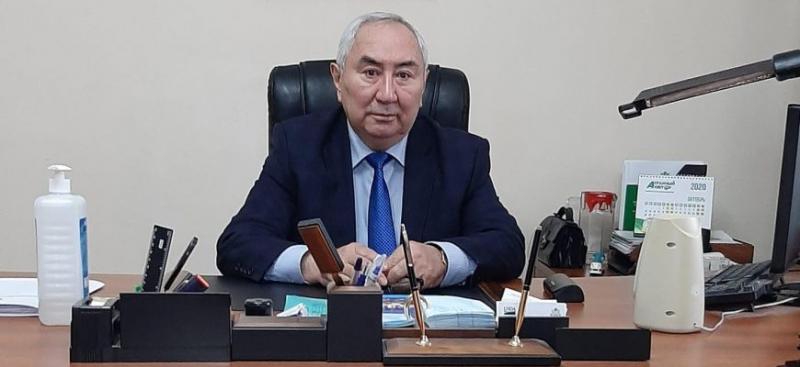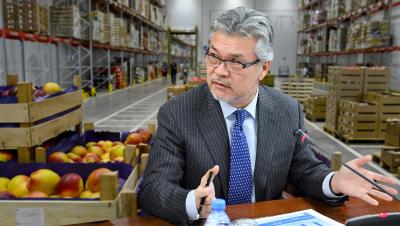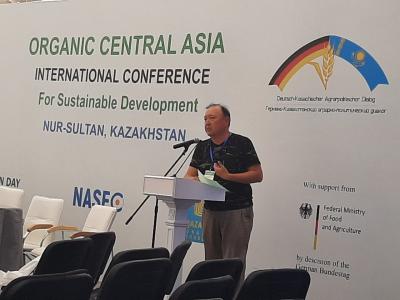
Recently, there has been a lot of information in the media about mismanagement of subsidization of the agro-industrial complex. Corruption in distribution of subsidies was brought up by the president himself. What other concerns do agrarians of Kazakhstan have? Read about it in the interview of Zh. Dairabayev, the Chairman of the Board of the Farmers Association of Kazakhstan, to the World of NAN portal.
Zhiguli Moldakalykovich, let's start our conversation with a hot topic - the amount of subsidies. A considerable amount of money is being allocated, but is it enough for the needs of farmers?
You may be surprised, but the amount of subsidies received by Kazakh farmers is 2-3 times less than in neighboring Russia or Belarus. But even those small subsidies are not given on time and remain insufficient. This is despite the fact that the development of the agro-industrial complex and the rural area is one of the priority areas identified by the Head of State. We have to acknowledge that at the moment all state support mechanisms are intended to stimulate large-scale production, while a considerable part of medium and small farmers have no access to cheaper credits and do not receive any subsidies.
How would you explain this situation? Don't large and small farms compete for state support on equal terms?
The main obstacle in obtaining subsidies is the complexity of the Qolday system. The main idea in developing this system was to digitalize public services and at the same time eliminate the need for direct contact between the applicant and the official. The result, however, was a product that only a computer-savvy farmer could use. Because the platform was a system, it immediately caused systemic problems. First, the program required an IIN, and many farmers who started out as farmers only had an BIN. Thus, most farmers were deprived of the opportunity to qualify for subsidies. Secondly, the system creates electronic maps of fields based on space monitoring data. The program which creates them often reduces the size of plots, as a result most farmers "lose" 5-10 hectares, which is a very significant amount for small farms with only 50-100 hectares. Since the subsidies are calculated on the area of land. The third problem is the technical aspects in dealing with the system. To receive subsidies, a separate specialist is required who files an application and monitors the time of money receipt. It is not difficult for a large holding to hire computer specialists, but for ordinary farmers it is impossible. Most often in small farms, due to the lack of specialists, the head of the farm himself is engaged in accounting, bookkeeping, sowing, plowing, and purchasing of agricultural products and equipment. In a word, it is impossible for him to sit in front of the computer, keeping track of applications, when there is no one to work in the field. There is another problem - despite the fact that public services should be provided free of charge, you have to pay to use the system. What's more, the owners of the Qolday system have increased their fees several times in 2020.
A lot of criticism has been and is being expressed about the system. There is no way that the Government is unaware of the dissatisfaction with the system on the part of farmers?
Everyone knows that the system does not work for farmers, and so does the government. But so far no action has been taken. As a result, it turns out that only selected farms receive state subsidies through the support system, and the application system periodically fails for unknown reasons. The question is when the issue, which has become a real pain of domestic farmers, will be solved. Information service operator Transtelecom introduced the new cost of the "Qolday" tariff from June 1, 2020, raising it from 2 MCI to 11 MCI. Farmers in the country protested en masse. Then, on June 10, 2020 Head of the Government A. Mamin at a meeting on the development of entrepreneurship in connection with an increase in the tariff 3.7 times, clearly stated that "farmers will not have to bear the additional burden. In turn, the Minister of Agriculture instructed to review the electronic system of subsidies and approve effective ways for farmers within two months. Farmers pay a lot of money to use the web portal. This system is specifically designed to support farmers. However, it is unclear why the platform makes money at the expense of farmers. If the owner of the new information system JSC "Information and Accounting Center" is 100% owned by the government, the service should be free. And it would be even better to receive this service on the portals of e-gov or information-analytical system (IAS) and transfer it to the regulation of the Ministry of Agriculture. We believe that certain adjustments should also be made to the subsidy rules.
What specific changes are you talking about?
In order to improve the availability of state support to farmers, the Association of Farmers of Kazakhstan sent proposals to the Ministry of Agriculture to amend the rules of subsidies and changes in collateral policy to the holding "Baiterek". In particular, to change the way of accepting real estate, land, purchased livestock as collateral, the cancellation of the reduction coefficients. The issue of subsidizing the interest rate on loans and leases remains open. The Ministry of Agriculture should pay subsidies directly to financial institutions and second-tier banks, following Russia's example. Today, farmers, the Department of Agriculture, are constantly working with a whole package of documents for the banks. All these issues, we voiced on October 15 this year at a meeting with the Minister of Agriculture E. Karashukeyev. The Minister promised to work out proposals with the holding and financial institutions.
Do concessional loans exist at the moment? How accessible are they to small farmers?
Concessional loans exist, but we can't speak about accessibility there either, there are problems. These are lack of funds, absence of "cheap" and " long-term" credits, coverage of mainly large farms by financing, low price of collateral, and frequent changes of lending terms. To solve these problems it is necessary to increase the volume of allocated funds, simplify the collection of documents for crediting, not to change the procedure and terms of crediting for at least three years. The Farmers' Association also offers to help with unsecured credit for beginning farmers - to lend to farmers at 1-2% for up to 10 years with a two-year grace period. We also believe that the collateral policy of JSC National Holding Baiterek and second-tier banks should be reconsidered. There is a need to use a higher coefficient in the assessment of collateral - increasing the liquidity and value of agricultural land. An excellent solution would be to create a specialized bank, which will work only with farmers and create really necessary conditions for lending.
Zhiguli Moldakalykovich, could you tell us about the renewal of agricultural machinery by farmers? How worn out is the fleet of agricultural machinery in our country?
We have to admit that the level of obsolescence of the tractor fleet in Kazakhstan is very high. 75% of the 142 thousand tractors used in agriculture have a depreciation period of more than 15 years. Figures speak for themselves. Analysis of renewal of agricultural equipment fleet showed that the regions do not reach the minimum technological level of renewal - 6%. In 2020, the average renewal rate was 4.1%.
Why? In your opinion, what measures are needed to stimulate farmers?
To accelerate the pace of renewal, regional akimats need to further increase subsidy rates for the purchase of priority types of agricultural equipment. Including for the cooperative associations. In this case, in addition to the national budget, allocate money from the local budget. Especially since such a normative right is provided by the rules of investment subsidies.
What is the situation with attraction of investments into agriculture? Is the sector interesting for foreign businessmen?
We lag behind the leading agrarian countries of the world in the sphere of attraction of investments into agroindustrial complex. In particular, the volume of foreign investment in agriculture in Australia is about 422 dollars per 1 hectare of arable land, in Canada - 80 dollars, and in Kazakhstan - not more than 1 dollar. That is 400 times less. The main condition for attracting investment abroad is the stability of agricultural production. This is formed, first of all, due to the effective agrarian policy of the state. If our agrarians, like foreign farmers, were provided with cheap loans with effective measures of state support, subsidies, guaranteed insurance system and scientific and technological achievements, our agrarian sector would be in great demand. On the part of investors there is a great interest in the agriculture of Kazakhstan, but the opportunities of the industry have not yet been fully disclosed, as there are constraining factors. Including the lack of stability of legislative documents. The rules of regulation, subsidization often change. Local farmers themselves do not always follow them, never mind foreign investors.
No matter how much we might want to, the country is not yet able to give up imports. Meanwhile, the state spends a lot of money on it. How can we make imports cheaper?
The answer is obvious. The only way to make imports cheaper is to increase the volume of our production, reduce its cost and increase the workload of our processing plants. The formation of an open trade policy, selling products to the population at bargain prices by reducing the number of intermediaries is very important. At the moment we can not fully provide the population with livestock products. For example, last year we provided the domestic market with beef by 95%, poultry - only by 55%, dairy products - almost by 90%. Unfortunately, most of the population believes that farmers are to blame for the rise in food prices. We often hear "they receive billions of subsidies, but prices are constantly rising. The average man does not know that subsidies do not reach all farmers. Therefore, if we want to provide the population with domestic products, it is necessary to create conditions for farmers to produce cheap products - to increase the amount of subsidies, provide cheap loans, help modernize agricultural machinery. In short, to help farmers reduce production costs.
What other issues are of concern to domestic farmers?
I have already mentioned some problems above. I must say that there are a lot of unresolved issues. For example, this year agrarians were affected by drought. There was no harvest, cattle breeders could not stockpile fodder. Almost all of them have loans. We advocate granting a two-year grace period on loans to farmers, taking into account the difficult situation. There are proposals on forward purchase contracts. This year, the corporation has set the price of wheat in the range 103-107 thousand tenge in quality. The Association of Farmers believes that it is necessary to set fair prices and revise the pricing policy towards an increase in the cost of wheat. Space monitoring of agricultural land is also recommended to transfer to another body - the national company "Қazakstan Gharysh Sapary".
Are there young farmers in the country? How do you think you can attract young people to agriculture?
Of course, there are young people who are now interested in the rural areas, in particular in agricultural business. But still they are few in number. Most young people don't want to go to auls, because the village has lost its attractiveness. Social and living conditions have deteriorated, the infrastructure is worn out, schools are closing. There is no housing, there is no work, everyday life is not organized, wages are small, there is no place for leisure too. To attract young people to the countryside it is necessary to put in order the infrastructure, roads, build social housing. It is necessary to lower the retirement age for rural workers. Restore benefits for health care, education of children, utilities, etc. Children of farmers should study for free!












































Обсуждение